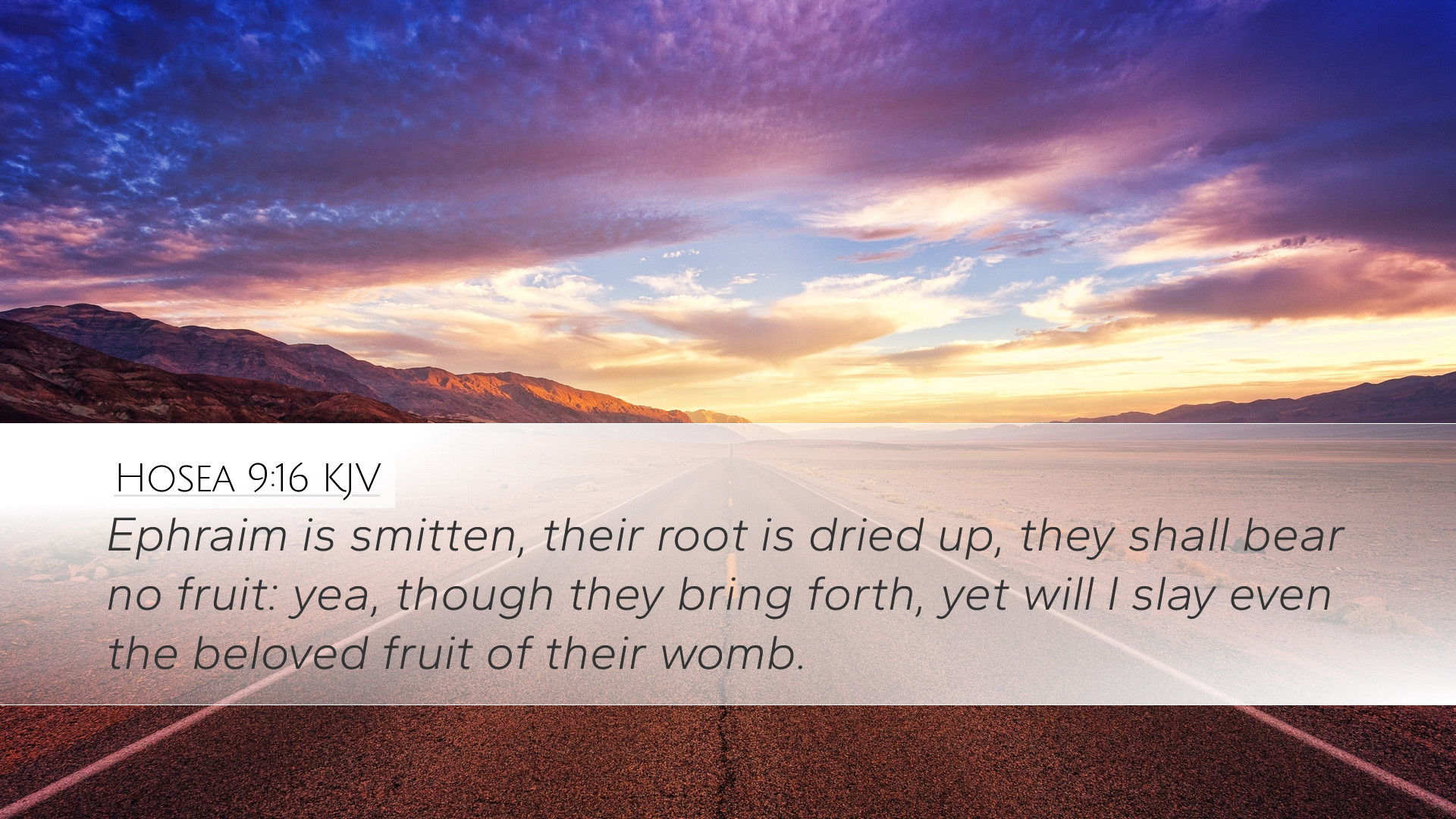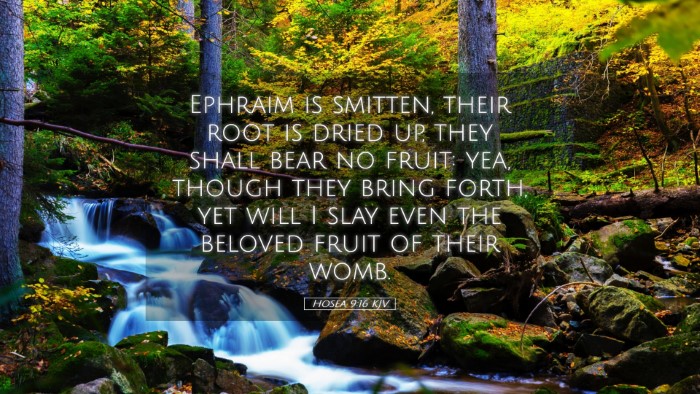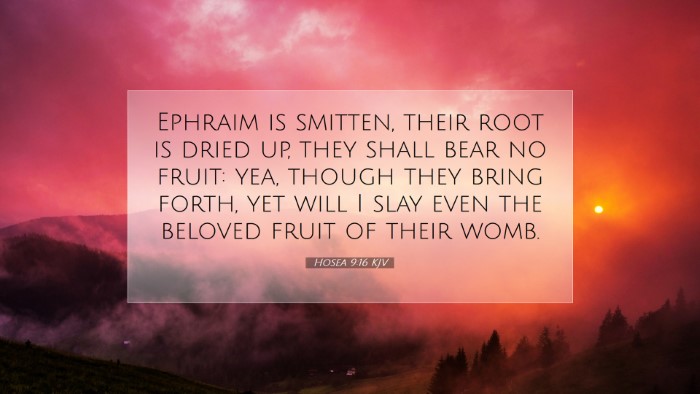Old Testament
Genesis Exodus Leviticus Numbers Deuteronomy Joshua Judges Ruth 1 Samuel 2 Samuel 1 Kings 2 Kings 1 Chronicles 2 Chronicles Ezra Nehemiah Esther Job Psalms Proverbs Ecclesiastes Song of Solomon Isaiah Jeremiah Lamentations Ezekiel Daniel Hosea Joel Amos Obadiah Jonah Micah Nahum Habakkuk Zephaniah Haggai Zechariah MalachiHosea 9:16
Hosea 9:16 KJV
Ephraim is smitten, their root is dried up, they shall bear no fruit: yea, though they bring forth, yet will I slay even the beloved fruit of their womb.
Hosea 9:16 Bible Commentary
Commentary on Hosea 9:16
Hosea 9:16 (KJV): "Ephraim is smitten, their root is dried up, they shall bear no fruit: yea, though they bring forth, yet will I slay even the beloved fruit of their womb."
Introduction
The Book of Hosea stands as a poignant reminder of God's faithfulness amidst Israel's infidelity. In Hosea 9:16, the verse articulates a grim reality for the northern tribes, particularly Ephraim, symbolizing the nation of Israel. This commentary synthesizes insights from public domain sources, elucidating the profound theological and historical implications of this verse.
Contextual Analysis
The context of Hosea's prophecy reveals a landscape of deep moral and spiritual decay within Israel. Hosea warns the nation of impending judgment due to their idolatry and spiritual unfaithfulness. Matthew Henry emphasizes that Ephraim, a dominant tribe, personifies Israel's overall rebellion against God. The verse encapsulates the consequences of turning away from divine commandments.
Albert Barnes draws attention to the metaphor of a "dried-up root." This imagery suggests a complete cessation of spiritual life and vitality in the tribe. Roots are essential for nourishment, and the drying up indicates a severance from God, the source of life.
Symbolism and Theological Implications
In this passage, the "fruit" represents the result of Israel's actions and their prosperity. Adam Clarke interprets the bareness of the vine as an inevitable consequence of divine judgment. Even if Ephraim attempts to bear fruit, the Lord indicates at the end of the verse that their offspring—representative of the future generation—will face dire consequences. God’s rejection of their fruit suggests a severe lack of approval from the Divine for their actions.
This reinforces the theological stance that true spiritual fruitfulness is contingent upon a faithful relationship with God. When nations or individuals choose idolatry and moral failings, they forsake the blessings that arise from obedience.
Historical Context
Historically, Hosea prophesied during a time of political instability and moral decay in Israel. The kingdom was fragmented, marked by corruption and infidelity to God. Matthew Henry notes that this period was characterized by a decline in righteousness and an increase in apostasy. Ephraim's plight serves as a microcosm of national judgment as the people overlooked their covenant relationship with Yahweh.
Understanding the socio-political backdrop sheds light on why God communicated such severe judgment. The emphasis on Ephraim's root drying up can also be viewed as lamentation over lost potential—both for the tribe and the nation as a whole.
Lessons for Contemporary Readers
The message of Hosea 9:16 resonates with contemporary audiences for various reasons. Firstly, it calls individuals and communities to self-examination regarding their spiritual health. Just as Ephraim faced consequences for straying from God, modern believers are reminded of the importance of steadfastness in faith.
Albert Barnes implicates the primary lesson of dependency on God. The message here is clear: when a community turns away from divine principles, they not only forfeit blessings but also face potential calamity.
Furthermore, the ramifications of Ephraim's unfaithfulness emphasize the intergenerational impact of sin. Both Matthew Henry and Adam Clarke note that the consequences of sin often extend beyond the present moment and affect future generations. This warning is crucial for families and churches today as they consider the implications of their corporate fidelity to God.
Conclusion
Hosea 9:16 encapsulates a critical moment of warning and lament that speaks volumes to the nature of divine judgment and human disobedience. The insights derived from public domain commentaries reinforce the theological realities presented in the text: the vital connection between faithfulness to God and the blessings of life and fruitfulness. This passage serves as a cautionary tale for all who seek to walk in righteousness, urging an earnest return to covenant fidelity, lest we too suffer the drying up of our spiritual roots.


